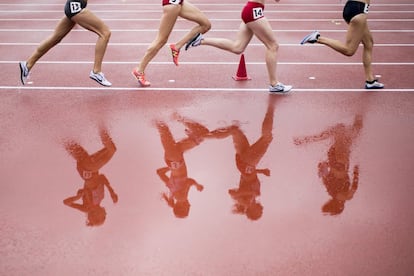Spanish athletes will undergo genetic femininity testing at this weekend's national championships.


The Spanish Athletics Federation has informed athletes with potential to compete in the upcoming World Championships in Tokyo (September 13-21) that they will take advantage of the Spanish Championships being held this weekend in Tarragona to organize testing for the SRY gene, which determines biological masculinity. According to the latest decision by the International Athletics Federation (World Athletics), only athletes who possess a femininity certificate (absence of the Y chromosome) before September 1 will be allowed to participate in international athletics competitions, starting with the World Championships in Tokyo.
The test is minimally invasive, even less so than a COVID antigen test —a swab taken from the inside of the cheek—and will be organized on the warm-up tracks. “It will be performed on approximately 22-23 athletes who have already qualified or are likely to qualify for Tokyo,” explains Raúl Chapado, president of the Spanish federation and vice president of the World Athletics Federation. “The samples will be sent to a certified laboratory, which will confidentially send the results to each of the athletes. This digital certificate must be downloaded from a secure platform accessible only to the World Athletics medical director. The test should only be taken once in a lifetime. The result is valid forever,” he adds. The remaining Spanish athletes with potential eligibility (the federation estimates that the team will have a maximum of 40 women) will undergo the test throughout August, paid for by the Spanish federation, which will receive $100 in aid per test from World Athletics.
Athletes found to have the SRY gene can request another test from another laboratory. If the positive result is confirmed, they will not be able to compete in competitions that count toward the women's world ranking unless they can prove that, despite being biologically male, they suffer from steroid insensitivity syndrome. Although their body produces testosterone like a man's, it has neither anabolic nor androgenic effects. This was the case with Spanish hurdler María José Martínez Patiño. 46-XY (male chromosome) athletes affected by the disorder of differentiated sexual development (DSD), assigned female at birth due to the absence of male genitalia, for example, who are currently competing because they have agreed to take estrogen medication to reduce their testosterone level below 2.5 nanograms/milliliter, will also be able to continue competing until the end of their careers.
Neither athletes like South African Caster Semenya, double Olympic 800m champion, affected by DSD who refused to take medication and denounced the obligation to do so before the International Court of Human Rights, nor transgender athletes (currently none of whom compete) will be able to participate in international competitions that count towards the ranking , practically all of them.
Do you want to add another user to your subscription?
If you continue reading on this device, it will not be possible to read it on the other device.
ArrowIf you want to share your account, upgrade to Premium, so you can add another user. Each user will log in with their own email address, allowing you to personalize your experience with EL PAÍS.
Do you have a business subscription? Click here to purchase more accounts.
If you don't know who's using your account, we recommend changing your password here.
If you decide to continue sharing your account, this message will be displayed indefinitely on your device and the device of the other person using your account, affecting your reading experience. You can view the terms and conditions of the digital subscription here.

Journalist for EL PAÍS since 1990. He regularly covers the Olympic Games, major cycling and athletics competitions, and doping news.
EL PAÍS




%3Aformat(jpg)%3Aquality(99)%3Awatermark(f.elconfidencial.com%2Ffile%2Fbae%2Feea%2Ffde%2Fbaeeeafde1b3229287b0c008f7602058.png%2C0%2C275%2C1)%2Ff.elconfidencial.com%2Foriginal%2F4b9%2F457%2Fe74%2F4b9457e749c3f1919107d387a0b01ce7.jpg&w=3840&q=100)
